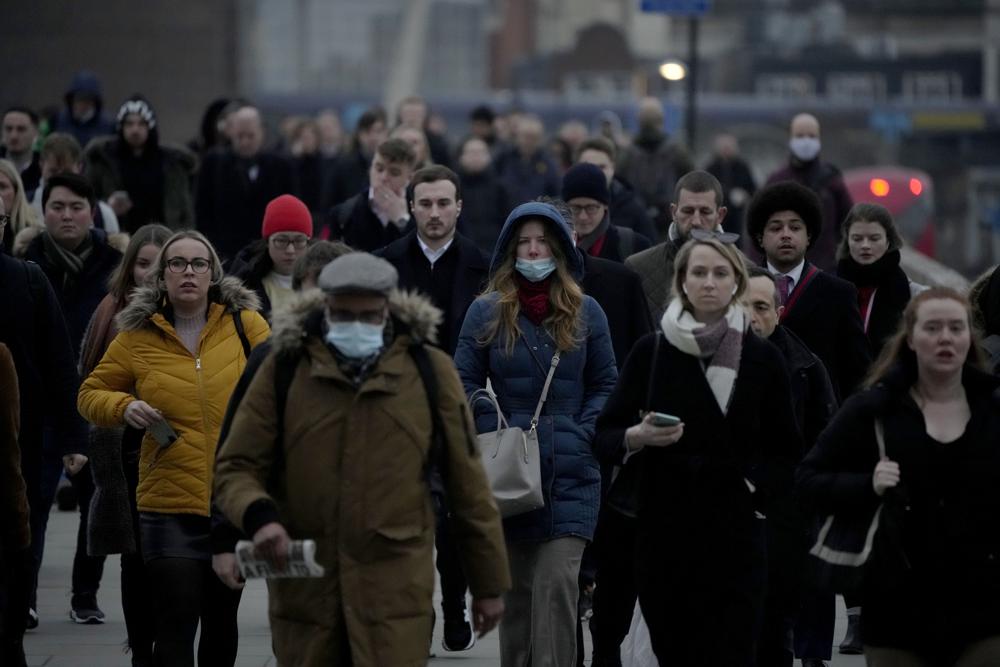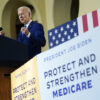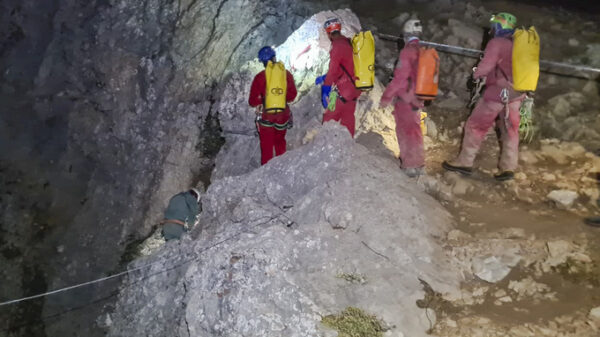FILE – Workers walk over London Bridge towards the City of London financial district during the morning rush hour, in London, Monday, Jan. 24, 2022. For many in the U.K., the pandemic may as well be over. Mask requirements have been dropped everywhere and free mass testing is a thing of the past. The sense of freedom is widespread even as infections soared to record levels in Britain in March, driven by the milder but more transmissible Omicron BA.2 variant that’s rapidly spreading around Europe, the U.S. and elsewhere. (AP Photo/Matt Dunham, File)
LONDON (AP) — For many in the U.K., the pandemic may as well be over.
Mask requirements have been dropped. Free mass testing is a thing of the past. And for the first time since spring 2020, people can go abroad for holidays without ordering tests or filling out lengthy forms.
That sense of freedom is widespread even as infections soared in Britain in March, driven by the milder but more transmissible omicron BA.2 variant that’s rapidly spreading around Europe, the U.S. and elsewhere.
The situation in the U.K. may portend what lies ahead for other countries as they ease coronavirus restrictions.
France and Germany have seen similar spikes in infections in recent weeks, and the number of hospitalizations in the U.K. and France has again climbed — though the number of deaths per day remains well below levels seen earlier in the pandemic.
In the U.S., more and more Americans are testing at home, so official case numbers are likely a vast undercount. The roster of those newly infected include actors and politicians, who are tested regularly. Cabinet members, House Speaker Nancy Pelosi, Broadway actors and the governors of New Jersey and Connecticut have all tested positive.
Britain stands out in Europe because it ditched all mitigation policies in February, including mandatory self-isolation for those infected. Prime Minister Boris Johnson’s conservative government is determined to stick to its “living with COVID” plan, but experts disagree on whether the country is coping well.
Some scientists argue it’s the right time to accept that “living with COVID” means tolerating a certain level of disruption and deaths, much like we do for seasonal flu. Others believe that Britain’s government lifted restrictions too quickly and too soon. They warned that deaths and hospital admissions could keep rising because more people over 55 — those who are most likely to get seriously ill from COVID-19 — are now getting infected despite high levels of vaccination.
Hospitals are again under strain, both from patients with the virus and huge numbers of staff off sick, said National Health Service medical director Stephen Powis.
“Blinding ourselves to this level of harm does not constitute living with a virus infection — quite the opposite,” said Stephen Griffin, a professor in medicine at the University of Leeds. “Without sufficient vaccination, ventilation, masking, isolation and testing, we will continue to ‘live with’ disruption, disease and sadly, death, as a result.”
Others, like Paul Hunter, a medicine professor at the University of East Anglia, are more supportive of the government’s policies.
“We’re still not at the point where (COVID-19) is going to be least harmful … but we’re over the worst,” he said. Once a high vaccination rate is achieved there is little value in maintaining restrictions such as social distancing because “they never ultimately prevent infections, only delay them,” he argued.
Britain’s official statistics agency estimated that almost 5 million U.K. residents, or 1 in 13, had the virus in late March, the most it had reported. Separately, the REACT study from London’s Imperial College said its data showed that the country’s infection levels in March were 40% higher than the first omicron peak in January.
Infection rates are so high that airlines had to cancel flights during the busy two-week Easter break because too many workers were calling in sick.
France and Germany have seen similar surges as restrictions eased in most European countries. More than 100,000 people in France were testing positive every day despite a sharp dropoff in testing, and the number of virus patients in intensive care rose 22% over the past week.
President Emmanuel Macron’s government, keen to encourage voter turnout in April elections, is not talking about any new restrictions.
In Germany, infection levels have drifted down from a recent peak. But Health Minister Karl Lauterbach backed off a decision to end mandatory self-isolation for infected people just two days after it was announced. He said the plan would send a “completely wrong” signal that “either the pandemic is over or the virus has become significantly more harmless than was assumed in the past.”
In the U.S., outbreaks at Georgetown University and Johns Hopkins University are bringing back mask requirements to those campuses as officials seek out quarantine space.
Across Europe, only Spain and Switzerland have joined the U.K. in lifting self-isolation requirements for at least some infected people.
But many European countries have eased mass testing, which will make it much harder to know how prevalent the virus is. Britain stopped distributing free rapid home tests this month.
Julian Tang, a flu virologist at the University of Leicester, said that while it’s important to have a surveillance program to monitor for new variants and update the vaccine, countries cope with flu without mandatory restrictions or mass testing.
“Eventually, COVID-19 will settle down to become more endemic and seasonal, like flu,” Tang said. “Living with COVID, to me, should mimic living with flu.”
Cambridge University virologist Ravindra Gupta is more cautious. Mortality rates for COVID-19 are still far higher than seasonal flu and the virus causes more severe disease, he warned. He would have preferred “more gentle easing of restrictions.”
“There’s no reason to believe that a new variant would not be more transmissible or severe,” he added.
Geir Moulson and Kirsten Grieshaber in Berlin, Angela Charlton in Paris, Barry Hatton in Lisbon and other AP journalists around Europe contributed to this report.
Copyright 2021 Associated Press. All rights reserved.









































